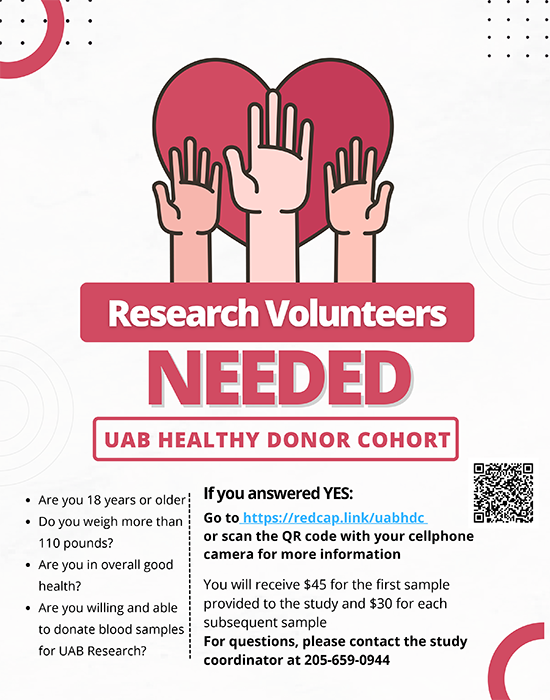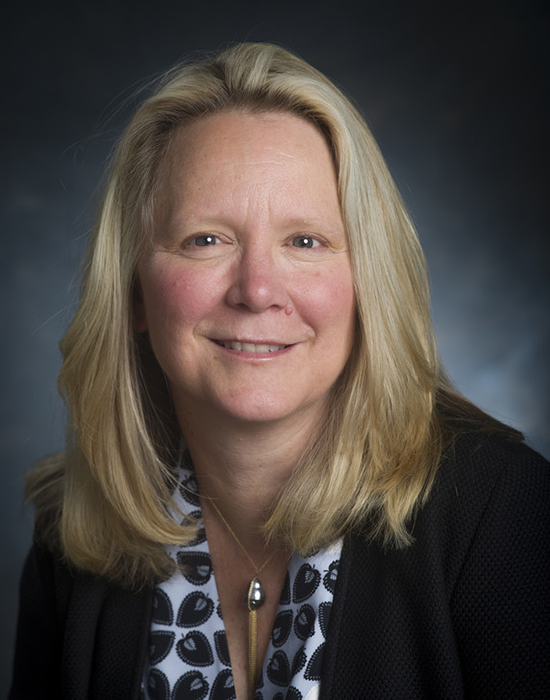 Needed: 5,000 healthy volunteers, who are willing to give a small blood sample if called in the future.
Needed: 5,000 healthy volunteers, who are willing to give a small blood sample if called in the future.
This on-call cohort is the goal of Fran Lund, Ph.D., and colleagues in the Immunology Institute at the University of Alabama at Birmingham, because it will solve a problem UAB researchers face.
“The great thing about UAB is, if you want to study a cohort of patients, we are a stronghold to find a clinician researcher to ask patients to participate,” Lund said. “Where we fail is getting healthy controls, matched for sex, age and so forth.”
The Immunology Institute is looking for healthy individuals to sign up by filling out a simple Healthy Donor Cohort online questionnaire. Those who fill out the questionnaire will join a registry of healthy people ages 18 to 80 who are willing to donate a small amount of blood in the future, if called. The healthy cohort acts as a control group to compare against blood samples from patients in a UAB study, where the healthy volunteers are matched for demographics like age, sex and race with the patient group. Enrollment and all participation in future studies is voluntary.
“We would certainly love the cohort to reflect Birmingham’s diversity,” said Lorenzo Thompson, M.D., the Clinical Research Administration manager for the Immunology Institute.
By being willing to be a potential donor, participants will help researchers learn more about the immune system and disease and may lead to the development of future treatments or therapies. Participants will be compensated for their time if they are asked to donate blood.
“If we end up with a cohort of 5,000 individuals who are healthy in the Deep South, it will open opportunities for important new research,” said Lund, director of UAB’s Immunology Institute.
 Fran Lund, Ph.D.Each blood draw will be small, from 10 to 100 milliliters, Thompson says. Ten milliliters is equivalent to 2 teaspoons, and 100 ml is about 7 tablespoons.
Fran Lund, Ph.D.Each blood draw will be small, from 10 to 100 milliliters, Thompson says. Ten milliliters is equivalent to 2 teaspoons, and 100 ml is about 7 tablespoons.
Most acute and chronic diseases are tightly interwoven with the human immune system, which acts as a sentinel and a fighter against infections and incipient cancers. Therapies to treat many diseases already leverage the power of the immune system, including vaccines against pathogens, or immune modulating treatments that act against cancer and chronic inflammatory diseases. However, the immune system can also go awry, creating inflammatory and immune-mediated disease.
A far greater knowledge of the detailed understanding of the immune system is needed.
The Immunology Institute was created to help coordinate and advance interdisciplinary research in immunology, a discipline that cuts across nearly every medical and basic research specialty. At the end of last year, the institute included 157 UAB faculty and 155 other members in six UAB schools and 35 divisions and departments. Active funding of these researchers totaled $91 million, from 16 National Institutes of Health institutes.
The Immunology Institute is part of the UAB Marnix E. Heersink School of Medicine.